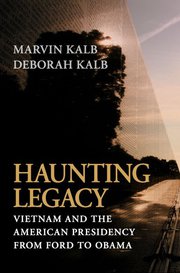Q&A with Ron Nessen, former White House spokesman and journalist
 Wednesday, May 16, 2012 at 8:13PM
Wednesday, May 16, 2012 at 8:13PM Ron Nessen's long and illustrious career includes covering the Vietnam War for NBC News and serving as President Ford's White House spokesman. He is now Journalist in Residence at the Brookings Institution.
Q: During the fall of Saigon in April 1975, you were serving as White House press secretary. Could you describe President Ford’s mood as the helicopter evacuation was underway?
A: There were a couple of different factors. He was particularly concerned about the Vietnamese who had helped the Americans during the war, and what would happen to them. The plan was that American aircraft carriers would take out the 1,300 Americans left in Vietnam—the helicopters would come, land in the embassy compound, and take the Americans to the aircraft carriers. The U.S. ambassador to South Vietnam, Graham Martin, was given the authority to determine how many Vietnamese would be evacuated. He concluded that 5,500 Vietnamese, including children, would have to be removed. The lift was supposed to take two hours, but it took 16 hours.
We were standing together, me, chief of staff Donald Rumsfeld, presidential assistant Dick Cheney, photographer David Kennerly, in Rumsfeld’s office. [Secretary of State Henry] Kissinger was there too. The evacuation was going on and on. Ford decided he would go up to the residence. All of us were so emotional about what was happening, we couldn’t think of anything appropriate to say. We all stood there in silence. I said, “Sleep well,” and then, as he was leaving, I said quietly, “If you can.” Thirty-four helicopters were evacuating the Americans, plus the 5,500 Vietnamese. At the very end, by now it was the next day, the helicopters were going back and forth; they began to suffer mechanical problems. Ford said, One more flight, to take Martin and his staff out, and that would be it.
Kissinger sent a telex to the ambassador. The ambassador was emotional; he said, I only take my orders directly from the president. So the president sent the order. They sent me and Kissinger to the Old Executive Office Building to do a final briefing. I said that all the Americans were evacuated from Vietnam. After the briefing, Brent Scowcroft , the national security adviser, said that 17 Marines were still in the embassy compound. Kissinger and I and Rumsfeld and Scowcroft were in a huddle, trying to decide what to do. I said something I’ve regretted ever since—I said, Let’s let it go; it will be true soon. Rumsfeld, of all people, given his reputation, said that this war has been marked by so many lies, let’s not let it end on one last lie. I went back and said I’d made a mistake, and that the last Americans—the Marines--would be out in a couple of hours.
Q: President Ford felt strongly about helping Vietnamese refugees come to the United States, but this was controversial at the time. Can you describe what happened?
A: The House of Representatives defeated a bill that would have provided $327 million in humanitarian aid to the Vietnamese refugees. I took the AP bulletin about the vote to the Oval Office and showed it to Ford. He said, “Goddamn it, those sons of bitches.” In all the time I’d known Ford, I had never heard him curse. He launched a very vigorous lobbying effort; he visited a refugee camp in Fort Chaffee, Arkansas. Eventually, Congress did provide funding.
Q: A couple of weeks after the fall of Saigon, the United States faced a crisis involving the seizing of the merchant ship SS Mayaguez off the coast of Cambodia; the Ford administration reacted with a robust show of force. Was the president’s decision-making affected by the recent events in Vietnam?
A: It was 100 percent. Kissinger and I had our problems, but he has this long view of history. The actions you take, you can’t really understand except after 30 or 50 years of history. He realized the United States’ leaving Vietnam, and leaving Vietnam to be taken over by the communists, could have an enormous effect on the rest of Asia, and could send a message that if China or Vietnam tries to take you over, the United States is not going to help you.
[The administration] needed to send a message that the United States was out of Vietnam, but not out of Asia. Here comes the Mayaguez, which was an opportunity to do that. The theory was to stop the communists who had seized the ship before they got the ship to port; it would be harder to get the crew back once the ship was in port. The first step was to send a message: Release the ship and crew, or pay serious consequences. But we had no way of communicating that; there was no American diplomatic representation. The Chinese refused to do it. We had frantic conferences in the White House.
The only way to get our message out was through the news media. It was one in the afternoon and the reporters were all out to lunch, so we sent people into all the nearby restaurants to tell them to get back to the White House quickly. The idea was that the communists would see the reports and let the crew go. The reporters started asking questions at the briefing once I had made my statement, but we had no time to spare, so I said, “Go file!” The message got through, and they did release the crew. Ford did believe they were testing America, and he felt he had to send a strong message.
Q: As someone who covered the Vietnam War, what would you say are the key differences between press coverage of that war, and coverage of the war in Afghanistan today?
A: There are two main differences. First, during the Vietnam War, the AP, NBC, other news organizations had bureaus in Saigon with big staffs; the war was intensely covered. Afghanistan is not covered to that extent, partly because the media is having financial difficulties. Also, the Vietnam War was before satellites and cell phones. I worked for a network—we had to ship the film for it to be processed and edited. Sometimes it was harder to deal with these logistics than to get the story in the first place.
We would go to Tan Son Nhut air base and give the stewardesses on commercial flights money and ask her to take the film to Tokyo or wherever the flight was going, and someone would meet it at the other end. It was probably 24 hours from the time we shot the story to the time it would get on the air. The radio was just as old-fashioned. We would go to the Post and Telegraph, PTT—it was in an old apartment building up on the 5th floor. They would connect you by shortwave radio to Paris. An old Vietnamese lady ran the office; I can still hear her in my head, “Allo, Paris? Ici Saigon!” The weather conditions would affect the shortwave radio.
But there were also some advantages. I could ship my film off, and then I’d have 24 hours to interview sources, do follow-ups, do my narration track. It gave me a little more time to be more thoughtful with my script. Today, there’s a 24 hour news cycle, a deadline every minute, you’re in constant contact; you have no time to do this. It discourages deeper thinking and more research.
Q: Do you feel that subsequent presidents have taken the lessons of Vietnam into account when making decisions about whether to send troops to war?
A: I do. When you think about the antiwar protests and the opposition to the Vietnam War, American presidents are much more cautious since then about getting entangled in foreign wars—given the unpopularity of the Vietnam War and its effect on politics at home. The younger generation has no first-hand [memory] of that time, but the war’s impact makes presidents more cautious.
Q: Anything else we should know?
A: Leading up to the fall of Saigon, President Ford was going to Palm Springs for his annual Easter vacation with his family. The radio operator on Air Force One handed me a note that Da Nang had fallen to the Viet Cong, and they were now sweeping south to Saigon. We landed, and the press was interested in getting his reaction. Ford ran across the tarmac at the airport in Bakersfield, California—he literally ran away from them. Ford later flew from Palm Springs to San Francisco to visit an American plane that was evacuating children who were supposed to be Vietnamese orphans, babies and children, to America. We later found that many were not orphans, but were children of Vietnamese military officers and government officials who had paid bribes to get their children on the flight. Ford got on the plane; I was behind him. It was a 20-hour flight, there was no time to change the babies’ diapers and the plane was really smelly!
[That period of time] was such an emotional time for Ford and for me. I had spent much of the last 10 years in Vietnam. My friend Tom DeFrank, who was with Newsweek, said there’s nothing Ford can do to save Vietnam, is there? I said no. I was overcome with emotion, and I put my head down and cried. Ford had scheduled a speech at Tulane University. On the plane down there, somebody handed him a note that the withdrawal of the last American troops from Vietnam was ending. In his speech, Ford used the expression that the U.S. role in the war was over. We all realized what an important speech this was.
On another point, in thinking about the similarities and/or differences between the Vietnam war and the Afghanistan war, I believe that in both cases American policy makers -- both military and civilian -- did not take into account the history, politics, local issues, cultures, etc., of the two countries. In the case of Vietnam, I believe LBJ and other policy makers did not take into account the history of the imperial period or the French colonial period, did not take into account regional differences (i.e. the Central Highlands vs. the Mekong Delta), did not take into account religious differences (i.e. the Buddhists vs. the Catholics), did not take into account tribal differences (i.e. the Hoa Hao vs. the Cao Dai).
In the same way, I don't think American policy makers currently and in the recent past have taken into account the history, colonial period, regional rivalries, religious and tribal differences, etc. of the Middle East, including Afghanistan. I sometimes mention this to friends in the State Department, Pentagon, CIA, etc. They say they provide this background to the policy makers, but it's usually not taken into account in making strategic and tactical decisions.
Interview with Deborah Kalb, co-author of Haunting Legacy.



Reader Comments